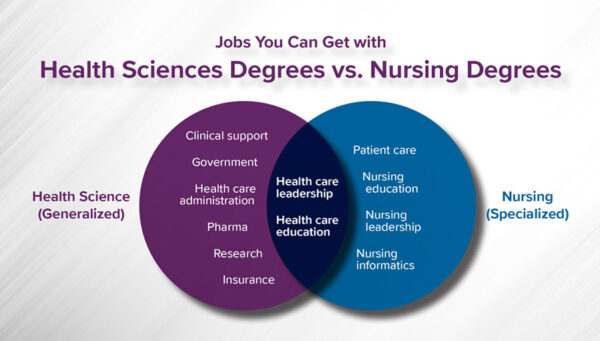Can You Become a Nurse with a Health Science Degree?

Nursing and health sciences coursework definitely overlap in areas. But can you become a nurse with a health science degree? The short answer is no. At least not directly.
Although earning a degree in health sciences gives you a broad foundation for a career in health care, you must earn a nursing degree that’s focused on direct patient care and then pass the NCLEX-RN exam to become a registered nurse.
That said, if you already have a health science degree or if you’ve completed some of the health science degree requirements, you can earn your nursing degree faster because some of the credits are the same for both degrees.
How Is a Degree in Health Sciences Different Than a Nursing Degree?

Although you can’t become a nurse directly with a health science degree, it does open the door to many career options in nonclinical and clinical roles.
Health science–related careers include hands-on patient-care roles like paramedic, respiratory therapist, or nutritionist. You may prefer lab-based work as a lab assistant or medical technologist. Biomedical equipment technicians, roles within biomedical and pharmaceutical companies, and positions with government agencies, insurance companies, and consulting firms are also open to you with this degree.
A Bachelor of Science in Health Sciences is your foundation for pursuing graduate and professional programs in pharmacology, chiropractic, physical and occupational therapy, dentistry, and medicine.
A nursing degree, by contrast, prepares you for a career directly caring for patients. To become a licensed registered nurse (RN), you need to earn an associate degree in nursing, which includes clinical training and classes in patient care, and then pass the NCLEX-RN licensing exam. You could also take the exam after earning your Bachelor of Science in Nursing, which would take longer to complete but would provide you with greater advancement and earning potential.
What Education Is Needed to Become a Registered Nurse?
You would need to earn your associate or bachelor’s in nursing, along with passing the NCLEX-RN licensing exam, to become a registered nurse. Although an associate degree in nursing is sufficient to take and pass the NCLEX-RN, it’s useful to compare a bachelor’s in nursing to one in health sciences to better understand why the education received with the former is necessary to become a registered nurse.
For starters, you would take some of the same classes to earn your bachelor’s in nursing as you would for a bachelor’s in health science, such as psychology, ethics, biology, nutrition, anatomy, biostatistics, and medical terminology, chemistry, and biology. The nursing component of the bachelor’s degree would also likely include classes about the nursing profession, informatics, leadership, communication and decision-making, research, teaching and learning, and public health, as well as clinical training (more in a bachelor’s program than you’d receive in an associate nursing program).
Liberal arts classes in humanities, history, and electives round out the degree.
Nursing programs include a live practicum that’s structured in a way to gain experience applying your clinical knowledge and skills, along with patient care expertise, in real-life situations under careful supervision.
The last step is passing the NCLEX-RN exam that covers care management, safety and infection control, health promotion and maintenance, psychosocial issues, and physiology that includes basic care and comfort, pharmacological and parenteral therapies, risk reduction, and physiological adaptation.
You can see why the answer to the question, Can you become a nurse with a health science degree? is no. It can be a good start, but it won’t give you the preparation you need to become a nurse.
What Are the Different Levels of Nursing?
You have a choice of nursing degrees and paths to becoming a nurse. Many people get started with basic credentials and build on their education as they work in the field, earning increasingly advanced degrees and building on their practical applied experience and expertise. Some decide to specialize and move forward with master’s degrees.
Among your options are:
- Associate degree programs (e.g., Associate in Applied Science in Nursing and Associate in Science in Nursing): An associate degree in nursing is a solid starting point for developing your knowledge of nursing. In addition to being able to take the NCLEX-RN to become a licensed registered nurse, you can apply your degree toward a BS in Nursing.
- Bachelor of Science in Nursing: This four-year undergraduate degree opens up more career opportunities with better-paying jobs. Some students prefer to complete their bachelor’s before taking the NCLEX-RN, though many RNs may decide to become licensed after earning their associate degree, working for a while as a registered nurse, and then going back to school for their bachelor’s. And if you’re a licensed practical nurse without either degree, you may be able to find an LPN to BS in Nursing program that offers an expedited pathway that applies your vocational learning to an undergraduate degree.
- Master of Science in Nursing programs: These give you ongoing education around specialized areas for the next level of your career. Examples of these include the MS in Nursing Education, MS in Nursing Informatics, and MS in Nursing Leadership and Administration of Health Care Systems. With a master’s, you can either enter advanced practice specialties or enter leadership roles within a health care organization. As with some undergraduate programs, registered nurses may be able to find expedited dual-degree programs where they could earn their bachelor’s and master’s quicker than pursuing the degrees separately.
Where you start your nursing career is less important than simply getting started. Exciting careers in the field all include expertise and practical experience that you can only receive from earning a degree and working as a nurse. Whether you start as an LPN, get an associate’s degree, build off of a health sciences degree, or earn a bachelor’s in nursing, you have a solid foundation for a rewarding career.



